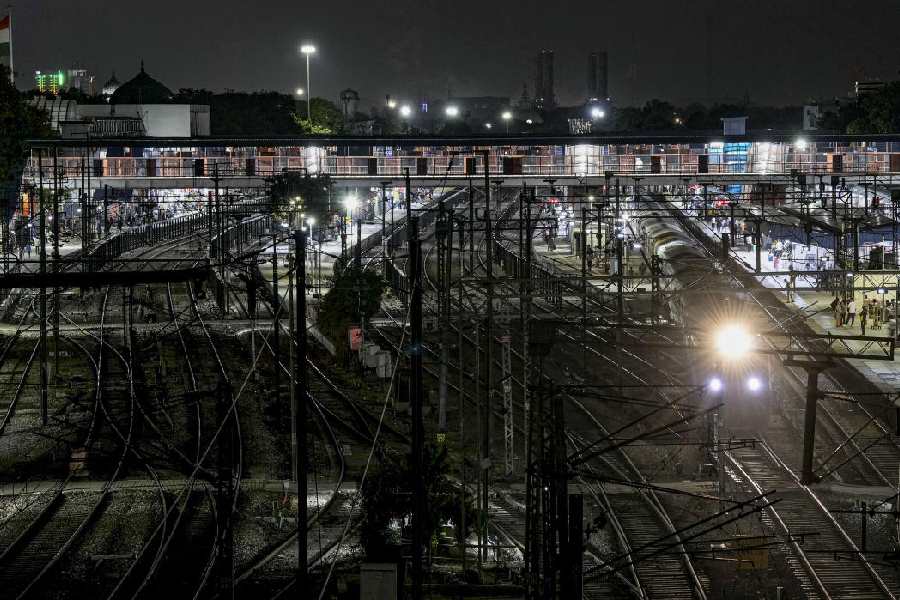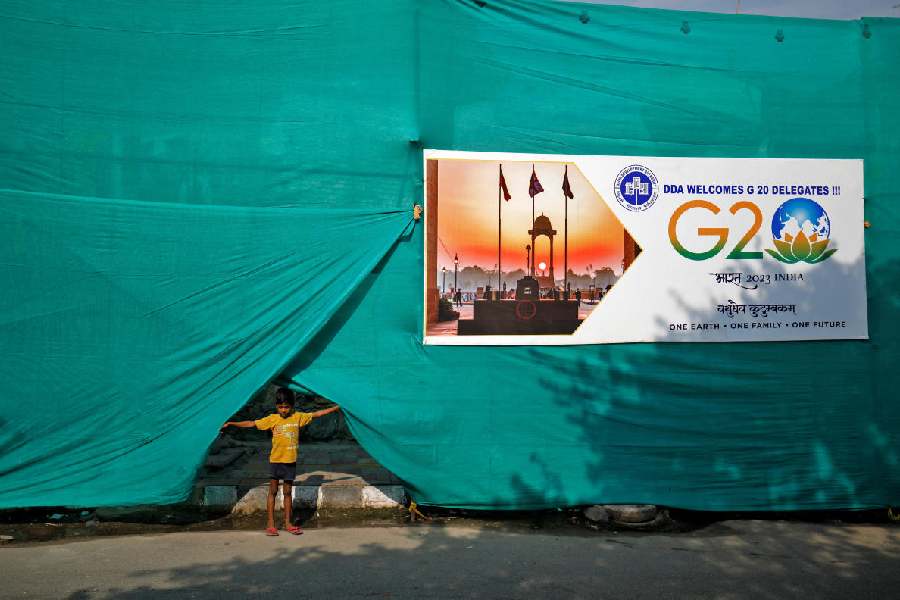Delhi has a charm of its own, making it distinct from other capital cities in the world. Though the splendid greenery that used to be its hallmark has been reduced, it still holds vast remains of the past glory of canopy.
The visitor who sees only the outward space of the newly decorated city will be fascinated by the illuminations and fountains. From the airport to Lutyens Delhi, walls have been newly painted, installations created and G20 hoardings put up.
The government has worked overtime to create the impression that India is the Vishwaguru (Teacher of the World), where all are happy and everything goes extremely well.
The greatness of Delhi was its unique rhythm of life.
Millions of people from different strata of life, following multiple religions and faiths, make this rhythm.
The majority of them are poor, living in pathetic conditions. Though the government tried to divide them on communal lines, they prefer to live in harmony.
They live in patched houses, their children facing unhygienic conditions; they lack safe drinking water and are denied basic sanitary facilities. Still, they celebrate life in their own way, making India distinctive.
As part of the preparations for the G20 Summit, tens of thousands of them were relocated to faraway places and the rest were hidden by newly put up veils or fences. Ironically, those newly built “walls” carry sermon-like quotes from Prime Minister Narendra Modi that promise unity, happiness, peace and progress!

Nizamuddin railway station after several trains were cancelled and diverted owing to security arrangements put in place for the G20 Summit, in New Delhi, Saturday, Sept. 9, 2023. PTI
For more than one year, the Modi government has been building up propaganda hype around the G20, saying India is marching ahead to become the third-largest economy in the world. For this exercise, the government spent 700 per cent more than what Germany had spent when it hosted the G20 Summit six years ago.
The cunningness of the Modi-style propaganda was such that the people were told the G20 presidency had come to India because of Narendra Modi’s “charismatic leadership”. The simple truth that the presidency comes on the basis of rotation, automatically, was buried deep by the stormtroopers.
High-sounding claims about environmental protection, development with a human touch, women’s empowerment, poverty eradication, equitable distribution of wealth, etc, were often repeated. They conveniently closed their eyes to the fact that the policies followed by the Modi government at home ran diametrically opposite to these proclamations.
The recently passed amendments to the Forest Conservation Act and the disastrous actions in the Greater Nicobar Islands reveal how unconcerned the government is about the challenges of climate change and the rights of the forest-dwelling people.
India faces pressing issues that demand immediate attention. The country’s staggering wealth inequality persists, with the top 1 per cent holding 58 per cent and the top 10 per cent possessing 80 per cent of the wealth, exacerbating the income gap.
Government policies, such as abolishing the wealth tax and reducing corporate taxes, have favoured the affluent while neglecting the needs of the marginalised. The state of public welfare is equally concerning, as India grapples with alarming statistics. Infant mortality remains high at 27.695 deaths per 1,000 live births, while essential programmes like food subsidies, supplementary nutrition for children, and midday meal budgets have been cut, perpetuating starvation and malnutrition.
India also struggles with an alarmingly low female labour force participation rate, with data indicating stagnation. Moreover, several ambitious promises, such as providing water, electricity and toilets to every household, eliminating malnutrition, giving broadband access to all villages, doubling farmers’ income, etc, have largely remained unfulfilled, raising questions about the government’s commitment to these ambitious goals. Addressing these pressing concerns should have taken precedence over the grandiose G20.
As the delegates to the G20 Summit landed in Delhi, the northeastern state of Manipur was undergoing a prolonged turmoil that has witnessed the loss of hundreds of human lives and large-scale damage to property.
India has had to hang its head as tribal women were forced to parade naked in Manipur. The world has come to know that the Government of India was hesitant to discuss the matter in Parliament.
In the same way, the government tried to cover up the large-scale corruption committed by certain corporate houses with political patronage from the ruling dispensation. For those in power, the G20 Summit is a glittering blanket to hide their political shortcomings and a propeller to gain electoral mileage.
The recent use of “President of Bharat” instead of the conventional “President of India” in the G20 Summit dinner invitation shows how afraid the Modi government is of the Opposition parties’ assumption of the name “INDIA”.
The BJP’s jitters about the name “INDIA” have suddenly made the word “India” itself repulsive to it. The decision by some media houses to pronounce “INDIA” as “I.N.D.I.A” — initial by initial, punctuated with “dots” — is evidence enough that the Opposition alliance’s choice of name has hit the government hard.
All that glitters in Delhi now is just a veneer that hides more than it reveals.
Binoy Viswam is a Rajya Sabha MP and secretary, CPI National Council










